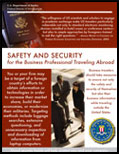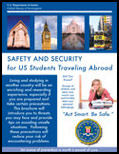International Travel
"Know Before You Go"
Travelers should refer to the Employee Travel or Student Travel brochures.
All countries have specific rules and regulations related to travel depending on the proposed destination, what you plan on taking with you, the nature of the activities associated with the travel, and with whom you will be working. Certain activities or exports may require a federally-issued license(s) for collaborations or exchanges of technical information. Certain companies, persons and universities are prohibited from certain practices including research collaboration. The following points of concern are those most often implicated by international travel or collaborations abroad and the various federal regulations and embargoes/economic sanctions requiring compliance prior to travel. Additional information is available at Hand-Carry Tools.
Destination
The “Florida Travel Act” Section 1011.90(6), Florida Statutes, prohibits State-funded official travel to countries designated as “state sponsor of terrorism” (Cuba, Iran, Sudan, Syria).
Travel to countries under a State Department travel warning must comply with UCF Policy 2-903 "Travel to Restricted Destinations” are available at: http://internationalization.ucf.edu/restricted_travel.php. Travel warning countries are listed at: https://travel.state.gov/content/passports/en/alertswarnings.html.
Travel to countries under a U.S. sanction or embargo may require specific government approval. Certain financial transactions and services of value are prohibited. Information concerning U.S. Sanctions programs and country specific requirements is available at: http://www.treasury.gov/resource-center/sanctions/Programs/Pages/Programs.aspx.
International travel must not involve the export of defense articles, data or performance of defense services, including instruction (see http://www.pmddtc.state.gov/embargoed_countries/index.html). This includes research collaborations involving research conducted in the U.S. subject to restrictions that does not otherwise qualify as “fundamental research.”
Restricted Parties, Entities, Universities, Persons & Companies
Certain foreign persons – including businesses, research institutions, universities, government and private organizations and other types of legal persons –may be subject to specific federal prohibitions, including prohibitions on research collaborations, for a variety of reasons and require specific licensing, even for educational exchange and are specified on the Entity List available at: http://www.bis.doc.gov/policiesandregulations/ear/744_supp4.pdf Other parties are specified at: http://export.gov/ecr/eg_main_023148.asp It is important to review the Entity List and understand compliance responsibilities and limitations before collaborating, or sponsoring an employee or visiting scholar of a university listed therein. The government has issued specific guidance pertaining to such activities at: http://www.bis.doc.gov/entities/entitylistfaq.html#28 Educational exchange, including travel to any entity on the list has specific license requirements and exclusions typically do not apply. The government has a policy of denial for licensing many of these entities.
Purpose of the Trip
Presentations & Seminars: In general, travel outside of the U.S. to attend a conference - not to present - does not require a license. However, information presented at seminars must be limited to topics that are not related to export-controlled items or technologies unless that information is already in the public domain. Open seminars are usually not problematic unless they take place in a sanctioned country or involve restricted parties. Exchanges of technical information including academic discussions could require a license.
Foreign Collaborations & Exchanges of Technical Information: Publically available information or fundamental research can be shared with foreign colleagues so long as the recipients are not employees or representatives of the government of a sanctioned country, or restricted parties. This includes normal academic peer-review or publishing processes.
Research & Instruction Outside of the U.S.: Research and course instruction conducted outside of the U.S. may not qualify for the fundamental research exclusion. Export controls may apply until the work is published or is otherwise in the public domain. Before teaching a course or disclosing information outside of the U.S. it is important to ensure that the information is not subject to export control laws and regulations. For instance, when interacting with foreign persons, you cannot provide a “defense service” which includes providing technical “know-how” related to the design, development, production, manufacturer, assembly, operation, repair, testing, maintenance or modification of a defense article or dual-use technology.
Furnishing Financial Assistance: OFAC regulations prohibit the university from providing material financial assistance or anything of value, including services, to any blocked or sanctioned country, individual, entity or organization, including a government agency of a sanctioned country. This can involve subcontracts, international vendors or payments to research participants. For example, a professional presentation, whether or not it contains materials controlled under ITAR or EAR, is deemed under OFAC to be a “service” and “something of value” provided to the recipient audience.
Export of Equipment or Data
Click here for “Tool of Trade” export requirements.
Travel to all international destinations may prohibit the hand-carrying or “export” of certain things. Such items may include data, software or technology, blueprints, design plans, field data, equipment and retail software packages and technical information. Items having both commercial and military or proliferation applications, proprietary information, or items that are considered defense articles, even if used in an academic or research environment are generally prohibited for export without specific federal licensing.
You need to comply with United States export statutes and regulations whenever you take equipment, devices, computer software or technical data on a trip outside of the country. In most situations, licensing is not required to take items abroad under a “tool of trade” exception with only a requirement of maintaining effective control of the equipment. Export regulations will generally not restrain you from taking commercially available laptop computers and standard software to most countries. However, other research equipment, select agents and toxins may not qualify under this exception. All data must qualify as public domain.
To qualify for the “tool of trade” exception, the export must:
- Be less than one year.
- Consist only of reasonable equipment, i.e. laptop computers, other portable computing devices, data storage devices and other equipment that people in your discipline would generally recognize as a ”tool of trade.”
- You must maintain effective control by retaining physical possession of the equipment at all times or securing the item in a secure environment such as a hotel safe, a bonded warehouse, or a locked or guarded meeting or conference facility.
- The travel cannot be to an embargoed country (Cuba, Iran, North Korea, Syria or Sudan).
You should not take with you ANY of the following without first obtaining specific advice:
- University-owned scientific equipment (other than a sanitized laptop computer, PDA or electronic storage device)
- Data or information received under an obligation of confidentiality including private information about research subjects.
- Data or analyses that result from a project for which there are contractual constraints on the dissemination of the research results
- Devices, equipment or computer software received with restrictions on export to or on access by foreign nationals.
- Devices, systems or software that was specifically designed or modified for military or space applications.
- Classified information
If U.S. Customs and Border Protection (CBP) officials suspect that a regulated item or defense article has been exported without a license, they may, for example, on your return examine files and software on your laptop computer as well as your baggage. For this reason, international travelers are encouraged to sanitize electronic devices by removing all non-essential data prior to leaving the United States. Inspectors in other countries may detain and copy your hard drive. Alternate safeguard methods include taking a blank laptop with only public domain files needed for the specific international trip or encrypting and then e-mailing to yourself any information you may need while overseas. Do not retrieve the e-mail until you have reached your destination, and remember you will need to remove it completely prior to returning to the U.S. or prior to crossing any international border.
Safety and Security for the Business Professional Traveling Abroad
Useful Links Related to Travel Outside the United States
- International Travel Compliance Review (pdf)
- Department of State International Travel
- Bureau of Consular Affairs, Dept of State
- Overseas Security Advisory Council
- Foreign Country Travel Warnings
- Department of State: “Doing Business in International Markets”
- U.S. Passport Information
- U.S. Embassies
- Health Information for U.S. Citizens Traveling Abroad (CDC)
- CIA world fact book


